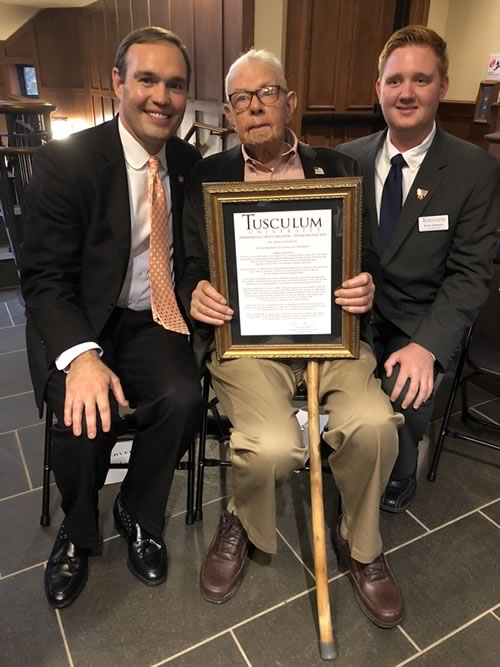
Tusculum University President, Dr. James Hurley, Arthur Ricker and Tusculum student, Kyler Johnson
With patriotic flair, Tusculum University celebrated Veterans Day Friday, Nov. 9, and honored the military service of a Greene County man who had a front-row seat to key moments in World War II.
Dr. James Hurley, the university’s president, issued a proclamation declaring Friday as Arthur Ricker Day at Tusculum. The document recognized Ricker’s contributions to the military, which included landing on Utah Beach during D-Day and serving as part of the liberation forces at Dachau concentration camp.
Ricker, 97, a resident of the town of Tusculum, was the focus at the afternoon Veterans Day event, sharing stories about his experiences while serving his country as a member of the Army.
He recalled his 11-day trip by boat to England, first to Liverpool before his transfer to the southern coast of that country. That put him close to water so he and his fellow servicemen could receive amphibious training, which he described as preparation for possibly the most dangerous combat one can face.
In 1944, he would join in one of the famous events of the war – D-Day.
“We were scheduled to land at Utah Beach on the fifth of June,” he said. “During the night, they had a bad storm in the North Atlantic, and Eisenhower postponed the invasion for another day to June 6. We landed on Utah Beach, Normandy, about 6:30 in the morning. It was just beginning to become daylight.
“We could see the paratroopers drop in at a distance. Most of these paratroopers dropped in water because the Germans had floodgates in the English Channel where they could flood this land at high or low tides. The paratroopers had chutes that were very difficult to get off, and they had approximately 90 pounds of weight on their backs. Many of them drowned because it took too long to get these chutes off.”
Ricker recollected the primary objective was to move through the English Channel and target a seaport the Germans held called Cherbourg. The Allies captured Cherbourg June 25, 1944.
Later, he was in southern France and crossed the Rhine River, went through a huge valley and entered a small village in Germany called Dachau.
“There was a very huge concentration camp, and I approached an inmate and tried to communicate with him. Of course, we had a language barrier. Off in the distance, I noticed something very unusual – it was furnaces. So I took it on my own to go off and explore this furnace. I looked at it. There were legs, arms and skulls.”
As he reflected on his service, he attributed his survival during the war to his mother’s prayers and thanked God that his life was spared. Taking a broad view, he said Americans live in a great country and should be proud of it, honor it, respect it and love it with all their mind.
Ricker’s talk impressed the audience, including Tusculum student Kyler Johnson, who served as the event’s emcee.
“Truly, Mr. Ricker, you do very well represent the Greatest Generation, and I only hope and pray that mine can even come close to serving this country in the manner that yours did,” Johnson said.
“One of the things that really resonated with me was that Arthur shared in his talk that he didn’t want recognition,” Hurley said. “The second thing that I learned in that lesson was you have to earn honor. I don’t know that I’ve learned more valuable lessons in my life than those two things.”
Congressman Phil Roe, R-1st, who chairs the House Veterans Affairs Committee, highlighted how all U.S. veterans cemeteries in this country and abroad are overseen by his committee. In May, he was asked to visit World War I and World War II cemeteries in Europe and said it was one of the most moving experiences of his life. He said he went to places such as Flanders Field and the Battle of Belleau Wood and said he cannot imagine what these servicemen experienced under the risk of potentially being shot.
“These are the shoulders this nation is built on,” Roe said. “These are the men that protect the constitution of the United States of America. These are the men that give us our freedoms. We could not be here if it were not for men like Mr. Ricker. I can’t thank him enough and the millions of men and women that allow me to live in a free country and to live and breathe in this great nation.
“So Mr. Ricker, I salute you, America salutes you and may God richly bless you.”


